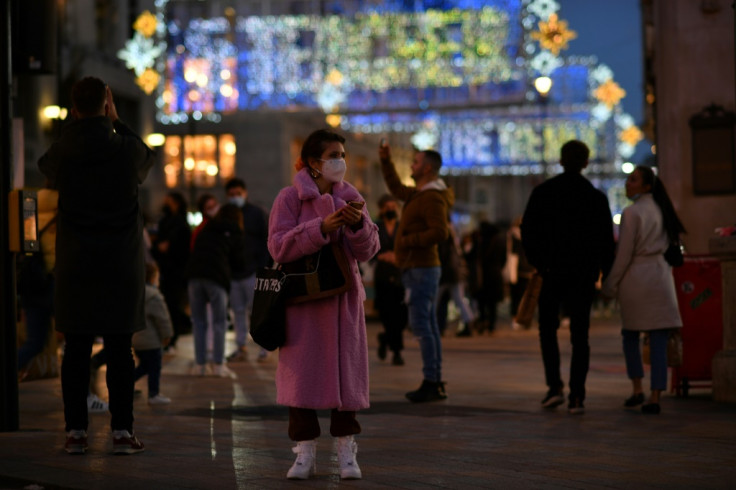Festive cheer lacking for London shoppers as lockdown looms
Many shoppers resented the lockdown, which comes just as shops geared up for the pre-Christmas rush.
Filling her shopping basket with Christmas cards in a central London department store glittering with baubles and tinsel, 84-year-old Marie Thomas was "fed up".
She was among a scattering of shoppers rushing to buy festive goodies Monday as England is set to close all "non-essential" stores for four weeks from Thursday, as part of new lockdown measures to cut soaring infection rates.
While many shoppers said they supported the measures, Thomas and others said they resented the lockdown, which comes just as shops geared up for the pre-Christmas rush.
"When we've finished the lockdown, the virus is still going to be out there, so where's it getting us?" said Thomas, who wore a facemask.
"I'm doing my Christmas shopping, you can see my cards, because they're closing, you can't go anywhere after Wednesday."
"Let's hope we still get Christmas," she said, adding that she hoped to celebrate with her large family including great-grandchildren.
"I said to my daughter: Father Christmas has still got to come to the kids, hasn't he? You've still got to carry on with your lives."

Another shopper, who gave his first name as Andrew, expressed similar scepticism over the lockdown as he admired baubles.
"I'm very much against it, quite honestly, I think the whole situation has been blown up out of all recognition," he said, decrying the impact on the catering and hospitality sectors.
"It's wrecking the whole economy of the country basically," he complained.
A major clothing chain, Primark, which does not sell online, has predicted it will lose ?375 million ($484 million, 416 million) from the latest lockdown.
Restaurants, pubs and bars will also have to close their doors, although they can remain open for takeaways or deliveries.
The Night Time Industries Association, a lobby group for the hospitality sector, has warned the shutdown will spell "financial armageddon" for businesses that are already struggling.

On Oxford Street, London's best-known shopping hub, the John Lewis department store flew rainbow flags to honour the state-run National Health Service.
The showpiece Christmas light display is normally switched on by a celebrity in front of huge crowds but social distancing restrictions forced organisers to shelve the event.
This year's elaborate lights feature angel wings and a message about "the spirit of Christmas".
Every week they will feature the name of a "hero" who helped others during the pandemic, nominated by the public.
Outside Hamleys toy shop, which was founded 260 years ago, the Disney song "The Bare Necessities" blared out as staff danced in red boiler suits and welcomed customers.
Amanda Crook, a 48-year-old reflexologist visiting London for the day, emerged from the store with a bag full of board games and said she was shocked by the lack of customers.
"It's so sad to see shops so empty. I've not been to London for a long time. It's the quietest I've ever seen it," she said.
"I just hope that the economy can recover from this."
Nevertheless, she said of the lockdown: "If it's going to save lives then I'd say, yes, it's probably the best thing for everybody."
Teenagers at a nearby bus stop were concerned at the physical closures, despite mainly shopping online.
"It's really annoying if you don't know if you're going to be able to find anything online and then not being able to go to the shops," said Poppy Edwards, 16, a student who wore dramatic cat-eye makeup.
Lawyer Lucy James, photographing her three-year-old daughter outside the half-timbered luxury store Liberty, said she thought this Christmas would be less about consumerism as the virus hit many people financially.
"I think this year's going to be a smaller Christmas... Less spending, I think, conscious that everyone's had a difficult time," said the 35-year-old.
"It's what we've got to do to slow everything down and hopefully go into the new year in a much better place."
Copyright AFP. All rights reserved.
This article is copyrighted by International Business Times, the business news leader



















